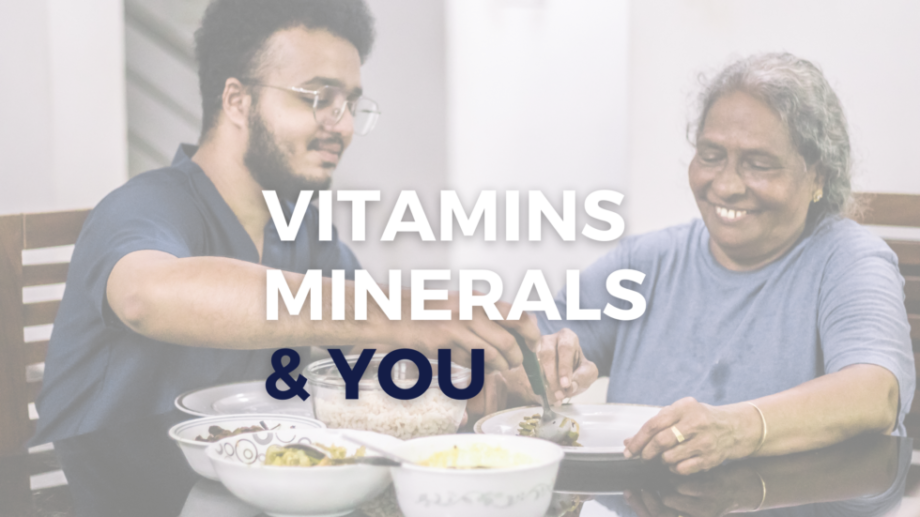Does it really matter that my morning orange juice is packed with vitamin C? And does it really matter that my pumpkin loaf is packed with vitamin A? Well…YES! Our bodies require vitamins and minerals to sustain our body health and wellness. But what are vitamins and minerals?
What Are Vitamins & Minerals?
You have likely heard this saying: food is fuel. Commonplace, but true! Food is—literally—fuel. Primarily because food supplies our bodies with the nutrients it needs to function. These micronutrients are broken down into two primary categories: vitamins and minerals. Our bodies require the following vitamins and minerals:
- Vitamins: A, C, D, E, K, and the B family
- Minerals: calcium, chloride, cobalt, copper, fluoride, iodine, iron, magnesium, manganese, phosphorus, potassium, selenium, sodium, sulfur, and zinc
Do not to let this list of essential nutrients overwhelm you. The average, healthy individual consumes sufficient amounts of these vitamins and minerals in well-rounded whole-food diets. If you struggle to consume essential nutrients through your diet alone, supplementation exists to close nutrient gaps.
What Are Trace Minerals?
We now know the vitamins and minerals are micronutrients essential for body growth and function. However, we can further break down the mineral category into major minerals and trace minerals. One mineral group does not take priority—major minerals and trace minerals simply refer to the mineral amount needed to sustain body health and wellness. See the intake difference of major and trace minerals below
- Major Minerals: daily recommended values are over 100 milligrams per day
- Trace Minerals: daily recommended values are under 100 milligrams per day
Daily recommended values of vitamins and minerals vary. However, the general standard to differentiate major and trace minerals is whether or not individuals need more or less than 100 milligrams per day to sustain body health and wellness.
Vitamins, Minerals & Your Diet
Again, do not to let the extensive list of essential nutrients overwhelm you. We often consume these nutrients passively throughout our day. When you grab a banana on your way out the door, do you grab it because of its high concentration of potassium? When you grab the bell peppers and hummus for an afternoon snack, do you grab it because of its high concentration of vitamin C? Most likely, no!
When you eat nutrient dense, whole foods, you introduce dozens of essential vitamins and minerals into your body! If you want to focus on intentional nutrient consumption, focus on consuming whole foods:
- Eggs
- Fish
- Fruits
- Legumes
- Nuts
- Seeds
- Vegetables
- Whole Grains
Whether you adhere to an omnivorous diet or plant-based diet, you likely consume a spectrum of vitamins and minerals that support your body health and wellness.
What If I Struggle to Get Nutrients in My Diet?
If you struggle to consume sufficient amounts of essential nutrients in your diet, consider supplementation! Supplementation exists to close nutrient gaps. If you have specific concerns about your individual vitamin and mineral needs, reach out to your healthcare provider.
Quick Facts:
Vitamins and minerals are micronutrients essential for body growth and function. We can further break down the mineral category into major minerals and trace minerals.
- Major Minerals: daily recommended values over 100mg/day
- Trace Minerals: daily recommended values under 100mg/day
Well rounded, whole food diets support sufficient vitamin and mineral consumption. If you struggle to consume adequate amounts through your diet, supplementation exists to close nutrient gaps.

